In Libya Rommel followed up his recent success by besieging British and Commonwealth forces in Tobruk, while driving the rest of the Allied army towards the Egyptian border. Meanwhile the German invasions of Yugoslavia and Greece continued: by the end of the week Belgrade and Salonika would be in German hands. The Luftwaffe launched heavy raids on Coventry and Birmingham, while on 9-10 April the RAF bombed Berlin, damaging the State Opera House.
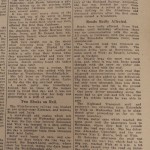 Caithness was recovering from its third great snowstorm of the year. As the John O’Groat Journal reported, a blizzard had swept the north of Scotland, isolating Caithness and Sutherland for a whole week and causing the deaths of three people – two men and a woman, all of whom were lost when they went out into the storm to tend their sheep. The railway line was blocked in two places, at Kinbrace and between Rogart and Lairg. The snow was so deep that it was possible for a man to stand on it and wrap his arms around the telegraph wires.
Caithness was recovering from its third great snowstorm of the year. As the John O’Groat Journal reported, a blizzard had swept the north of Scotland, isolating Caithness and Sutherland for a whole week and causing the deaths of three people – two men and a woman, all of whom were lost when they went out into the storm to tend their sheep. The railway line was blocked in two places, at Kinbrace and between Rogart and Lairg. The snow was so deep that it was possible for a man to stand on it and wrap his arms around the telegraph wires.
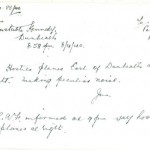
German planes continued to harass the county. At 8.58pm on Tuesday 8 April Constable Kennedy of Dunbeath reported: “Hostile planes east of Dunbeath at great height, making peculiar noise. RAF informed at 9pm,say hostile planes alright.”
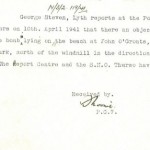 The Caithness coastline was threatened by sea, as well as from the air. Wick Police received the following report on 10 April: “George Steven, Lyth reports at the Police Station, Wick at 1715 hrs on 10th. April 1941 that there [is] an object believed to be a smoke bomb lying on the beach at John O’Groats, above the high water mark, north of the windmill in the direction of the Lighthouse. The Report Centre and the S.N.O. Thurso have been informed.”
The Caithness coastline was threatened by sea, as well as from the air. Wick Police received the following report on 10 April: “George Steven, Lyth reports at the Police Station, Wick at 1715 hrs on 10th. April 1941 that there [is] an object believed to be a smoke bomb lying on the beach at John O’Groats, above the high water mark, north of the windmill in the direction of the Lighthouse. The Report Centre and the S.N.O. Thurso have been informed.”
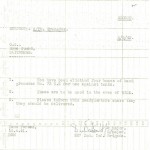
No one knew that Hitler had decided to call off the invasion of Britain and was now planning to attack Russia instead. The Home Guard continued to prepare for the worst, and to build up arms in case of an invasion. On 10 April the Wick commander of the Home Guard was informed in a memorandum marked “Secret”: “1. You have been allotted four boxes of hand grenades No. 73 H.E. [high explosive] for use against tanks. 2. These are to be used in the area of WICK.”
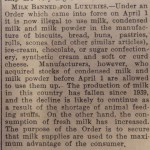 Finally this week there was another sign that the German blockade was taking effect. The John O’Groat Journal reported that “it is now illegal to use milk, condensed milk and milk powder in the manufacture of biscuits, breads, buns, pastries, rolls, scones (and other similar articles), ice-cream, chocolate or sugar confectionery, synthetic cream and soft or curd cheese.” Leaving aside the challenges involved in milk-free ice-cream, the intention was to build up stocks of condensed milk and cheese for the winter.
Finally this week there was another sign that the German blockade was taking effect. The John O’Groat Journal reported that “it is now illegal to use milk, condensed milk and milk powder in the manufacture of biscuits, breads, buns, pastries, rolls, scones (and other similar articles), ice-cream, chocolate or sugar confectionery, synthetic cream and soft or curd cheese.” Leaving aside the challenges involved in milk-free ice-cream, the intention was to build up stocks of condensed milk and cheese for the winter.
